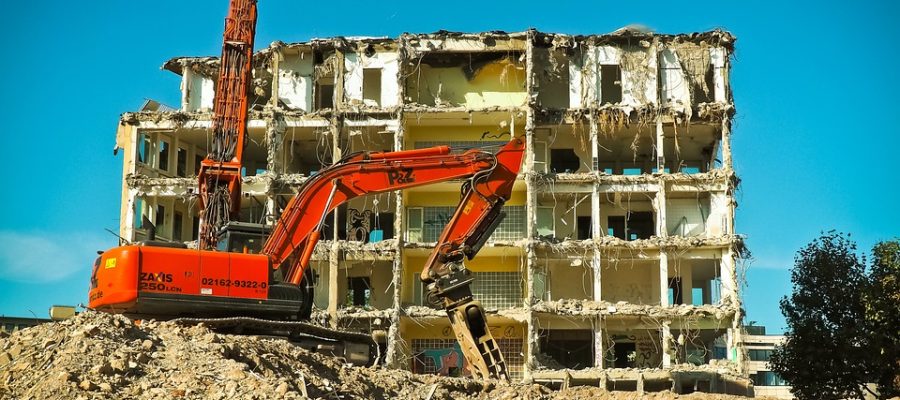Learn about safe disposal practices for demolition residue, including asbestos handling and environmental considerations, from Roadbridge Services Ltd. Stay compliant and protect the environment with expert tips.
Introduction
At Roadbridge Services Ltd., we understand that demolition is a critical aspect of construction, involving the safe dismantling of buildings to make way for new projects. However, once the demolition is complete, managing the residue left behind becomes equally important. Demolition residue, such as concrete, metals, hazardous materials like asbestos, and other debris, must be handled and disposed of properly to avoid environmental damage and health hazards. In this article, we will explore the best practices for safe disposal of demolition residue, focusing on the environmental impact and regulatory guidelines.
The Importance of Proper Demolition Residue Disposal
Demolition residue isn’t just waste; it contains materials that can be harmful to both human health and the environment. At Roadbridge Services Ltd., careful management is part of our commitment to safety and environmental responsibility. Here’s why proper disposal is essential:
- Environmental Protection: Prevents harmful chemicals from contaminating ecosystems.
- Health and Safety: Protects workers and communities from exposure to hazardous materials.
- Legal Compliance: Meets local, state, and federal regulations for waste management.
Types of Demolition Residue
Demolition projects generate various types of waste. Roadbridge Services Ltd. ensures a systematic approach to handle and dispose of different materials.
1. Concrete and Masonry
These materials make up a significant portion of demolition waste. Though generally non-hazardous, Roadbridge Services Ltd. advocates for recycling whenever possible to reduce landfill usage.
2. Metals
Steel, aluminum, and copper can be recovered and recycled. Roadbridge Services Ltd. ensures that all recoverable metals from demolition are repurposed, reducing the environmental impact.
3. Hazardous Materials
Hazardous materials such as asbestos, lead, and mercury need specialized disposal methods to ensure they do not pose health risks. Roadbridge Services Ltd. follows strict protocols to handle these materials safely.
Safe Disposal of Asbestos
Asbestos is one of the most dangerous materials found in older buildings. Exposure to asbestos fibers can cause serious illnesses like lung cancer and mesothelioma. At Roadbridge Services Ltd., we take every precaution to handle asbestos safely.
Asbestos Disposal Guidelines by Roadbridge Services Ltd.
- Identify and Assess: Before demolition begins, Roadbridge Services Ltd. assesses the site for the presence of asbestos.
- Hire a Certified Contractor: We only use licensed contractors to handle and remove asbestos.
- Proper Sealing: Asbestos is sealed in leak-proof containers before transportation to prevent exposure.
- Dispose of in Designated Facilities: We ensure asbestos waste is taken to certified facilities that handle hazardous materials.
The Role of Recycling in Demolition Residue Management
At Roadbridge Services Ltd., we are committed to recycling demolition debris to reduce the environmental impact of construction projects. Many materials, such as metals, concrete, and wood, can be recycled rather than sent to landfills.
Benefits of Recycling Demolition Residue
- Reduces landfill waste: Recycling reduces the volume of material that ends up in landfills.
- Lowers environmental impact: Reusing materials lowers the need for new resources.
- Cost savings: Recycling can offset the costs of demolition by reducing disposal fees and sometimes generating revenue from scrap materials.
Environmental Considerations in Demolition Residue Disposal
The environmental impact of improper waste disposal can be catastrophic. At Roadbridge Services Ltd., we prioritize eco-friendly methods to prevent pollution from demolition debris.
1. Air Pollution Control
Dust and airborne particles generated during demolition can be controlled by using water sprays and other dust suppression techniques that Roadbridge Services Ltd. regularly implements.
2. Soil Contamination Prevention
We ensure that no hazardous materials seep into the soil, conducting regular site inspections to prevent contamination.
3. Water Pollution Prevention
At Roadbridge Services Ltd., we take measures to contain hazardous materials and ensure proper disposal to protect nearby water bodies.
Regulatory Compliance for Demolition Residue Disposal
Demolition residue disposal is heavily regulated to protect public health and the environment. Roadbridge Services Ltd. ensures that we comply with all necessary regulations for safe waste management.
Key Regulations Followed by Roadbridge Services Ltd.
- EPA Guidelines: The Environmental Protection Agency (EPA) outlines the proper disposal of hazardous materials, including asbestos and lead, which we strictly adhere to.
- Local and State Regulations: We follow all local and state requirements for demolition residue disposal.
- OSHA Standards: The Occupational Safety and Health Administration (OSHA) provides safety regulations for handling hazardous materials, which Roadbridge Services Ltd. implements on every project.
FAQs on Safe Demolition Residue Disposal
Why is asbestos dangerous during demolition?
Asbestos fibers, when disturbed, can become airborne and are highly toxic if inhaled. They can lead to severe respiratory diseases, including lung cancer and mesothelioma.
Can all demolition materials be recycled?
No, not all materials can be recycled. However, materials like concrete, metals, and wood are commonly recycled. Hazardous materials such as asbestos require specialized disposal.
How can I reduce the environmental impact of demolition residue?
The best way to reduce the environmental impact is through recycling, reusing materials, and ensuring that hazardous materials are disposed of in compliance with regulations, which Roadbridge Services Ltd. can help with.
Who is responsible for the safe disposal of demolition residue?
The demolition contractor, such as Roadbridge Services Ltd., is responsible for ensuring the safe disposal of debris.
What happens if demolition residue is disposed of improperly?
Improper disposal can lead to fines, legal consequences, environmental damage, and health risks for the community.
Conclusion
At Roadbridge Services Ltd., we believe that proper disposal of demolition residue is essential to every project. From recycling materials to handling hazardous waste like asbestos, we follow strict guidelines to ensure safety and minimize environmental impact. By implementing safe disposal practices and staying compliant with regulations, demolition projects can be conducted responsibly, protecting both people and the environment.




